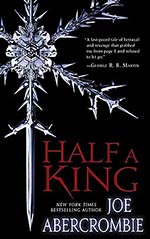
![]() Nymeria
Nymeria
9/13/2014
![]()
I've been looking forward to this book since I saw it mentioned online: my only experience with Joe Abercrombie's writing has been with Best Served Cold, one of the most fascinating reads of the past few years, and that single one was enough to make a fan out of me. This new work went beyond every expectations I had, even though many articles indicated it would be Abercrombie's first attempt at a YA novel: that's not a sub-genre I enjoy, but I wanted to trust the author, and the gamble paid off handsomely.
First things first: in my opinion, the only reason this novel as been marked as YA (apart from some possible marketing goals) is that the main character is a teenager, and probably because the graphic (but never gratuitous) violence I encountered in Best Served Cold is quite toned down here. But that's about it, because the themes are very adult, and the protagonist reacts in a very adult, believable way, while he travels on his coming-of-age journey.
Young Prince Yarvi is the second son of the king of Gettland and is being groomed for ministry - in other words, a cross between diplomat, alchemist and back-room counselor. That would probably be the normal fate for any second son, but Yarvi has something else working against him, because his left hand is crippled - he was born deformed, the perpetual object of scorn from his father, older brother and the whole court - half a man is the kindest description attached to him. Not having been raised in the warlike customs of his people, he had the means of developing intelligence, cunning and knowledge to counterbalance his lack of physical skills, and he's quite content of waiting for the final exam that will sanction his acceptance as a minister. Unfortunately, both his father and brother are killed in an ambush and he's raised to the throne, a position he feels totally inadequate for - as courtiers and people alike are more than happy to remind him. Yarvi tries to do the best he can with what he has, until the day he's betrayed and sold into slavery, ending as a rower on a merchant galley: this marks the beginning of his evolution, because the strife for survival in a harsh environment toughens him up in unexpected ways - both physical and psychological - and he gathers around him a motley crew of friends and allies that will follow him on his path to revenge.
Yarvi is an easy character to root for: not just because of the physical shortcomings that make him the target of cruel jokes (it's easy to side with the underdog!), but because he takes those shortcomings with more than a pinch of self-deprecating humor, and constantly tries to overcome them with the other gifts he's been bestowed with. In this way, he reminds me of another character I love, Miles Vorkosigan from Lois McMaster Bujold's acclaimed Vor Series: Yarvi accepts his limitations, and even when circumstances make him resent them, he always bounces back, finding a way of working around them, and landing on his feet - sort of. What's interesting, in his development, is the easy way he forgets his "better angels" and takes no prisoners on his way toward revenge: if he felt unsuited to the role of king when it was dropped on him unexpectedly, now that he wants to reclaim his right he stops at nothing on his way back. In a flash of insight Yarvi understands the change brought on by the circumstances, when he realizes that his previous failures did not happen "... because he lacked the skill, or the strength, or even a hand. He had lacked the will. And somewhere [...] he had found it."
Or again "...he had left a boy, and returned a man." His life until the moment of betrayal had been a continuation of childhood, something he might have sought to prolong by hiding his shame and inadequacy in the Ministry: once forced to grow, he knows he can hide no longer.
The young prince is not the only character of note, though: the group of slaves he first befriends and then involves in a semi-successful escape, contains several great figures: Yarvi's oarmates Jaud and Rulf, steadfast and cheerful the first, delightfully grumbling the second; Sumael, a girl whose inner strength fascinates Yarvi. One of the book's best creations is gaudy Captain Shadiksharram, the owner of the merchant ship, perpetually drunk and hiding her cruelty under a (very thin indeed) veneer of motherlike geniality. But one towers over them all, the man named Nothing: the first time Yarvi sees him, he's condemned to perpetually scrub the ship's deck as a punishment for his escape attempt, the target of the captain's persecutory malice, just one step removed from catatonia or madness - or both. But when the group manages their escape he transforms into a fierce warrior, one who constantly speaks of the glory of battle, stomping without fear where even the bold fear to tread. Nothing is indeed a larger-than-life figure, a man who uses rage and hate to fuel his strength, and yet does it with a sort of cheerful disposition: it's difficult to put into words such a complex, and wonderfully drawn character, he must be enjoyed by reading. And he has a few surprise aces up his tattered sleeve...
A great book, a wonderful read (Joe Abercrombie owes me several hours of missed sleep...) and the satisfaction of knowing that the next two installments of this trilogy will be paced at six-months intervals, so I know I can look forward to more from this world by January of next year. I just wish that other authors would be so kind to their readers...
http://spaceandsorcery.wordpress.com